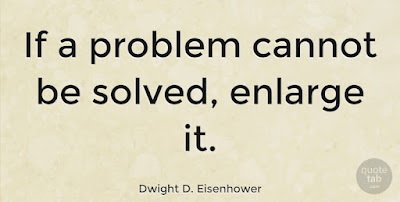The Eisenhower Principle
By Kim Bellard, December 17, 2021
I’ve finally come to understand why the U.S. healthcare system continues to be such a mess, and I have President Dwight Eisenhower to thank.
I’ve been paying close attention to our healthcare system for, I hate to admit, over forty years now. It has been a source of constant frustration and amazement that – year after year, crisis after crisis – our healthcare system doesn’t get “fixed.” Yes, we make some improvements, like ACA, but mostly it continues to muddle along.
Then I learned about President Eisenhower’s approach to problems:

That’s it! All these smart people, all these years; they didn’t know how to solve the problem that is our healthcare system, so they all took the Eisenhower approach: enlarge the problem. Let our healthcare system get so bad that not addressing it no longer is possible.
If, indeed, there is such a point.
The actual Eisenhower quote is more nuanced than the above version. It was: Whenever I run into a problem I can't solve, I always make it bigger. I can never solve it by trying to make it smaller, but if I make it big enough, I can begin to see the outlines of a solution.
I guess we’re not yet at the point when the outlines of a solution are clear (Bernie Sanders notwithstanding).
Instead, we’ve been chipping away at the problem, trying to make it smaller. For example:
- Employer-sponsored health insurance tax preference (WWII)
- Hill-Burton Act (1946)
- Medicare/Medicaid (1965)
- Federal HMO Act (1973)
- Stark Physician Self-Referral Law (1989)
- DRGs (1983) & RBRRVS (1992)
- CHIP (1997)
- Medicare Modernization Act (2003)
- Affordable Care Act (2010)
I could add a plethora of non-legislative efforts, largely private sector driven. Each was well-intentioned, each was expected to make a dent in a problem, and each was subsumed into the maw of our healthcare system.
But we still pay way more than any developed country for our healthcare system, for health outcomes that put us, at best middle of the pack. Yes, some of the best care in the world can be found here, but most people shouldn’t expect to receive it
One might have thought that a global pandemic would make the problem big enough. Yet still the outlines of a solution continue to elude us. It seems there is no health problem so big that we can’t turn into a political issue, not even a pandemic.
Even before the pandemic, we were facing epidemics of chronic diseases, such as diabetes and obesity, as well as gun violence, opioid addiction, and mental health. In Gen Z’s lifetimes, much less those of millennials or Baby Boomers, the problems in our healthcare system have grown from huge to unfathomable. When it comes to healthcare, we’ve let the problem get big enough. It’s been enlarged to the point it is hurting us, our economy, and our futures.
Yet here we are, still fumbling for solutions.
By now, we shouldn’t just have shadows of solutions. By now, the problem is so big that solutions should be crystal clear to everyone. But they’re not.
We shouldn’t be surprised. We’re very good at kicking the can down the road.
Our infrastructure is aging, brittle, and outdated, but even the recent Infrastructure and Investment Jobs Act is much smaller than it really needed to be. The racial wealth gap is a consequence of shameful historical patterns, yet continues to widen; it is not survivable for a democracy.
We’ve learned only half of Eisenhower’s adage: we’ve got the letting the problem get bigger part down, but we’ve forgotten the part about how/when to come up with solutions.
Where’s Eisenhower when we need him?
This post is an abridged version of the original posting in Medium. Please follow Kim on Medium and on Twitter (@kimbbellard)
 Post a Comment |
Post a Comment |  Friday, December 17, 2021 at 07:45AM
Friday, December 17, 2021 at 07:45AM 

Reader Comments